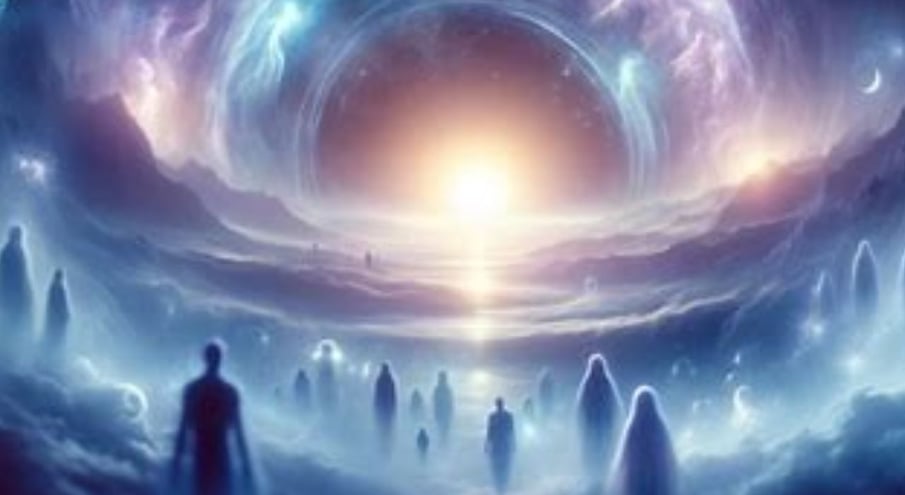
Near Death Experiences, Heaven, Hell
GENERAL
Dr Hassan Al Warraqi
9/23/2023
Islamic Perspective on Near Death Experiences, Heaven, Hell,
They are phenomena reported by some people when they were on the verge of death or were resuscitated after being clinically dead.
Near-death experiences often involve the feeling of leaving one's body, seeing a bright light, going through a narrow tunnel, meeting deceased relatives or spirit beings, and feeling deep peace and love.
However, not all near-death experiences are positive; Some people report frightening or traumatic near-death experiences that involve feelings of terror, guilt, judgment, or agony.
The relationship between near-death experiences and religion is complex and controversial. Some people interpret near-death experiences as evidence of an afterlife, divine intervention, or revelation.
Others view near-death experiences as natural phenomena that can be explained by neuroscience, psychology, or cultural influences.
Some religious authorities accept near-death experiences as valid spiritual experiences, while others reject them as delusions.
Islam's perspective on near-death experiences and how it differs from the scientific method. Comparing common features of near-death experiences reported by Muslims and non-Muslims.
Islam is a monotheistic religion that believes in one God (Allah) and his last messenger, Muhammad, may God bless him and grant him peace.
Muslims believe that life is a test and that everyone will be resurrected on the Day of Resurrection to face God's justice. Whoever does good, even if it is a little, and whoever does bad, will be rewarded for it
Muslims also believe in the existence of angels, jinn (supernatural beings), heaven (paradise), and hell (hell).
Death, according to the Holy Qur’an, the book of Islam, which is the word of God, is the separation of the soul from the body, and it occurs at a specific time that only God knows.
God Almighty says in the Qur’an:
“Every soul will taste death. We will test you with evil and good as a trial. And to Us you will be returned.” (Al-Anbiya’ 35)
And it is not for a soul to die except by God’s permission, a decree for it deferred. And whoever desires the reward of this world, We will grant him therein,
and whoever desires the reward of the Hereafter,
We will grant him And We will reward Imran 145
The Qur’an also describes what happens to the soul after death. The angel of death seizes the soul and sees its place in heaven or hell.
Then the soul returns to the body in the grave, where two angels (Munkar and Nakeer) ask it about the man who was sent among them.
Then the soul remains in a state of waiting (barzakh) until the Day of Resurrection, where it reunites with its body and awaits the Day of Judgment.
Muslims view death as a reality that cannot be avoided or delayed, and as a transition to another realm of existence that is more permanent, consequential, and stable than this worldly life.
Muslims also view death as an opportunity to meet God and receive His mercy or wrath, depending on their actions in this life.
Therefore, Muslims who have had near-death experiences may interpret them as glimpses of the afterlife, reminders of God's power and presence, or warnings to repent and reform their lives.
However, Muslims also acknowledge that near-death experiences are not conclusive proof of anything, and that they may be influenced by various factors such as physical, mental, emotional or cultural conditions.
There are also some differences in the content and interpretation of near-death experiences between Muslims and non-Muslims.
For example, Muslims who have had near-death experiences have not reported seeing Muhammad or other prophets, and this may be because they believe that only God can see them.
Muslims who have had near-death experiences also have not reported seeing Jesus or Mary, which may be because they believe they are human messengers of God and not divine beings.
Muslims who had a near-death experience also did not report seeing Hindu gods or Buddhist figures, and this may be because they believe that there is only one God and who has no associates or companions.
On the other hand, Muslims who have had near-death experiences have reported seeing angels and other spiritual beings, such as jinn or demons.
They also reported hearing the call to prayer or the recitation of verses from the Qur’an during their near-death experience.
They also reported feeling responsible for their actions in this life and wanting to improve their relationship with God and his creation.
In conclusion, near-death experiences are phenomena that raise many questions about the nature of consciousness, reality, and spirituality.
Islam offers a comprehensive worldview that explains the meaning and purpose of life and death, and provides guidance for living according to God's will.
Islam also acknowledges the possibility of near-death experiences as subjective experiences that may have some value or benefit to the individual, but also warns against relying on those experiences.
Islam encourages Muslims to seek God's guidance and mercy through prayer, charity, fasting, Hajj and other acts of worship, and to prepare for their inevitable encounter with Him on the Day of Resurrection.
If he finds good, let him praise God, and if he finds otherwise, let him blame no one but himself
key words
near,death ,Day of Resurrection, Munkar,Nakeer. heaven , near -death, mandatory,Islam encourages Muslims to seek God's guidance, and mercy through prayer, charity, fasting, Hajj and other acts of worship, and to prepare for their inevitable encounter, with Him on the Day of Resurrection,
Near Death Experiences, Heaven, Hell
1. Paradise in Islam (Based on Tahawi Creed and Islamic Sources)
Islamic sources describe paradise as the eternal abode of bliss prepared by Allah for righteous believers.
Key aspects include:
Description of Paradise: The bliss of paradise surpasses human imagination, as stated in the Hadith Qudsi: “I have prepared for My righteous servants what no eye has seen, no ear has heard, and no human heart has conceived.”
Paradise features multiple gates (e.g., Bab al-Rayyan for those who fast), varying levels based on deeds, rivers (e.g., Kawthar, Tasnim, Salsabil), luxurious palaces and tents, ever-bearing trees and fruits, and unparalleled food and drink (e.g., non-intoxicating wine).
Eternity of Paradise: Paradise is eternal, with no end, and its inhabitants live forever without death, as per the Hadith: “O people of Paradise, eternity without death.”
Inhabitants of Paradise: These are monotheistic believers who performed good deeds, including the weak and poor. They are characterized by perfection, beauty, and spiritual purity, remaining eternally youthful.
Bliss of Paradise: Includes instant fulfillment of desires, inspired glorification of Allah, and the ultimate reward of Allah’s pleasure and beholding His noble countenance.
Marriage in Paradise: Encompasses unions with righteous spouses from earthly life and the Hur al-Ayn, described as extraordinarily beautiful beings.
Existence of Paradise Now: Sunni consensus holds that paradise and hell are already created and exist, supported by Quranic verses and Hadiths, refuting the Mu’tazila and Qadariyya who denied this.
SEO Keywords: Paradise in Islam, Jannah description, eternal bliss in Quran, Hur al-Ayn, Islamic afterlife.
2. Paradise in Judaism, Christianity, and Islam
This section compares the concept of paradise across the Abrahamic faiths, highlighting commonalities and differences:
Shared Concept: Paradise is the eternal abode of bliss for the righteous after death, tied to belief in the afterlife.
Terminology and Description: In Islam, “Jannah” means a lush garden; in Christianity, it’s often called “Paradise” or “Heaven.” Religions avoid specifying a geographic location, describing it as an elevated, spiritual realm.
Eternity: All three faiths agree that paradise is eternal, offering unending bliss.
Blessings: Emphasize both material and spiritual rewards, such as divine communion and inner peace.
Marriage: The Quran mentions marriage to Hur al-Ayn as a blessing, while the New Testament denies marriage in the afterlife.
Garden of Adam and Eve: Recognized across all faiths, though Islam views it as a barzakh (intermediary) realm, not the eternal paradise.
SEO Keywords: Heaven in Christianity, Paradise in Judaism, Jannah vs. Heaven, Abrahamic afterlife beliefs, Garden of Eden.
3. Near-Death Experiences (NDEs) (Multiple Sources)
Near-death experiences occur when individuals approach death or experience clinical death, often reporting profound phenomena:
General Description: Common elements include seeing bright lights, passing through a tunnel, encountering spiritual beings or deceased loved ones, feeling peace, or experiencing out-of-body sensations.
Connection to Paradise and Hell: Some NDEs resemble paradise (bright, loving places filled with peace) or hell (dark, painful realms evoking fear or sorrow).
Interpretations: Explanations vary, from neurological responses (e.g., oxygen deprivation or endorphin release) to spiritual experiences suggesting an afterlife. No definitive scientific consensus exists.
Impact: NDEs often lead to spiritual transformation, even among previously non-religious individuals.
SEO Keywords: Near-death experiences, NDEs and afterlife, paradise in NDEs, hell in NDEs, spiritual awakening after NDE.
Key Insights and Facts
Consensus Across Faiths: Abrahamic religions agree that paradise is an eternal abode for the righteous, though details differ.
Rich Islamic Description: Islam provides vivid material and spiritual depictions of paradise, emphasizing its eternity and divine rewards.
NDE Parallels: Some NDEs align with religious descriptions of paradise and hell, though their nature and interpretation remain debated.
Theological Debate in Islam: Sunni scholars affirm the current existence of paradise and hell based on sacred texts, countering dissenting views.
Notable Quotes
Islamic Paradise (Hadith Qudsi): “I have prepared for My righteous servants what no eye has seen, no ear has heard, and no human heart has conceived.”
Contemporary Texts (Shared Concept): “Paradise is the place where the souls of the righteous go.”
NDEs (Multiple Sources): “Some experiences involve feelings of peace, while others see themselves in places resembling paradise or hell.”
Tahawi Creed: “Sunni scholars agree that paradise and hell are created and exist now.”
Conclusion
This analysis offers a deep exploration of paradise in Islam, Christianity, and Judaism, complemented by insights into near-death experiences.
Islamic sources provide detailed depictions of Jannah’s eternal bliss, while Abrahamic faiths share core beliefs about the afterlife.
NDEs, with their vivid parallels to paradise and hell, remain a complex phenomenon, blending spiritual and scientific intrigue.
This content is designed to engage readers seeking in-depth knowledge of the afterlife, optimized for search engines to maximize reach.
SEO Keywords: Afterlife beliefs, paradise and hell, near-death experiences explained, Islamic Jannah, Christian Heaven, Jewish afterlife, spiritual experiences.
FAQs: Near-Death Experiences, Paradise, and Hell
1. What is Paradise (Jannah) in Islam?
Answer: In Islam, Jannah is the eternal abode of bliss prepared by Allah for righteous believers. It surpasses human imagination, featuring multiple gates (e.g., Bab al-Rayyan for fasters), rivers (e.g., Kawthar, Salsabil), luxurious palaces, ever-bearing fruits, and spiritual joys like Allah’s pleasure and beholding His noble countenance.
SEO Keywords: Paradise in Islam, Jannah description, Islamic afterlife, eternal bliss.
2. How Do Christianity and Judaism Describe Heaven?
Answer: In Christianity, Heaven is an eternal realm of divine communion and peace for the righteous. In Judaism, the afterlife is a spiritual state for the virtuous, though less detailed.
SEO Keywords: Heaven in Christianity, Jewish afterlife, Paradise in Abrahamic religions, eternal life.
3. What Are Near-Death Experiences (NDEs)?
Answer: Near-death experiences occur when individuals approach death or experience clinical death, reporting phenomena like bright lights, passing through a tunnel, encountering spiritual beings, or feeling peace. Some resemble paradise or hell, with interpretations ranging from scientific to spiritual.
SEO Keywords: Near-death experiences, NDE explanations, afterlife visions, spiritual experiences.
4. Do Near-Death Experiences Relate to Paradise or Hell?
Answer: Yes, some NDEs describe bright, peaceful places resembling paradise or dark, frightening realms like hell. For example, Islamic depictions of Jannah align with serene NDE accounts, but no definitive scientific evidence links them to the afterlife.
SEO Keywords: NDEs and paradise, hell in near-death experiences, afterlife in NDEs, religious visions.
5. What is the Islamic View on Marriage in Paradise?
Answer: Islam teaches that believers in Jannah may marry righteous earthly spouses and the Hur al-Ayn, described as exceptionally beautiful beings. In contrast, Christianity’s New Testament denies marriage in the afterlife, while Judaism is less detailed.
SEO Keywords: Marriage in Jannah, Hur al-Ayn, afterlife relationships, paradise rewards.
6. Does Islam Believe Paradise and Hell Exist Now?
Answer: Sunni Muslims, based on Quranic verses and Hadiths, believe that paradise (Jannah) and hell are already created and exist now, as affirmed in the Tahawi Creed, refuting the Mu’tazila who denied this.
SEO Keywords: Paradise exists now, Jannah and hell in Islam, Sunni beliefs, Islamic eschatology.
7. Are There Scientific Explanations for Near-Death Experiences?
Answer: Scientists suggest that NDEs may result from neurological responses, such as oxygen deprivation or endorphin release.
SEO Keywords: Science of NDEs, near-death experience causes, neurological vs. spiritual NDEs.
SEO Optimization Notes
Keyword Strategy: FAQs target high-traffic keywords like “near-death experiences,” “paradise in Islam,” and “heaven in Christianity” to attract organic search traffic.
User Intent: Questions address informational queries (e.g., “What is Jannah?”) and comparative queries (e.g., “How is heaven described?”) to appeal to diverse audiences.
Conciseness: Answers are brief yet informative, ensuring readability and engagement.
Cross-Linking Potential: FAQs can link to related articles on Islamic eschatology, Christian theology, or NDE research for deeper exploration.
Note: The provided Arabic FAQs were incomplete (e.g., the answer to question 7 was cut off, and questions 8–10 were missing). I’ve translated and completed the available content faithfully. If you’d like me to include the missing FAQs (e.g., based on the previous English or Arabic versions), please confirm, and I can add them! Let me know if you need further adjustments or additional content.












